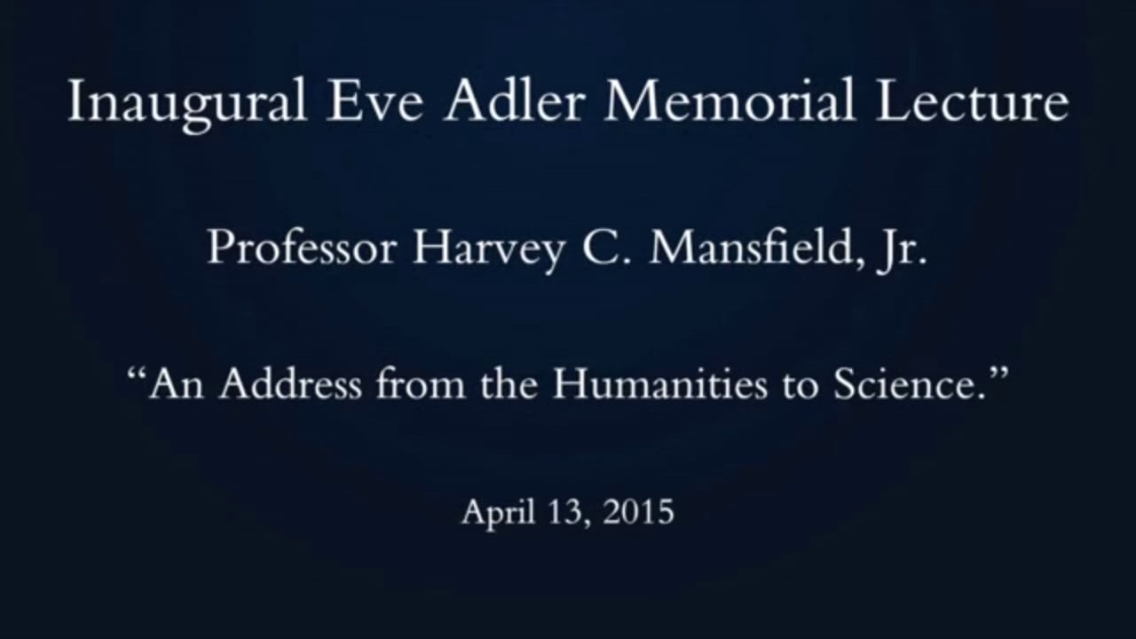Classics Department Celebrates Endowment, Naming
MIDDLEBURY, Vt. – Students, faculty, and staff packed into Dana Auditorium on a warm spring afternoon for a joyful celebration of the humanities at Middlebury on Monday, April 13. The gathering celebrated the endowment of the College’s Classics department by an anonymous donor and the naming of the department in honor of Professor Eve Adler, who was a major figure in the department from her arrival in 1977 until her death in 2004. Harvey C. Mansfield, Jr. delivered the inaugural Eve Adler Memorial Lecture.
In his welcoming remarks, Professor Marc Witkin, chair of the Classics department, noted that Adler was a tireless champion for her field, developing new programs in Greek, Latin, and Classical Hebrew at Middlebury. “Eve’s lecture courses on the ancient epic in the classical tradition of the liberal arts and sciences–the latter tracing the rival claims of rhetoric, philosophy, natural science, and theology from Plato and Cicero through Augustine and Francis Bacon–were among the most important formative intellectual experiences for hundreds of Middlebury undergraduates from the late 1970s to the early 2000s,” said Witkin.
Witkin said that students wishing to make Adler’s acquaintance today “can best come to know her through her master work, her extraordinary interpretive study of Virgil’s Aeneid entitled Vergil’s Empire: Political Thought in the Aeneid.” In the acknowledgements of that book, Adler expressed her gratitude for the support and encouragement of Harvey C. Mansfield, Jr., the William R. Kenan, Jr. Professor of Government at Harvard. Witkin said he and his colleagues agreed that Mansfield was the obvious choice to introduce a new generation of students to Adler’s unique combination of interests.
Mansfield, the inaugural speaker of the Eve Adler Memorial Lecture, delivered a provocative meditation titled “An Address from the Humanities to Science,” in which he questioned the reason for the current minimization of the humanities in colleges and universities. Mansfield argued that high esteem for science has disoriented the humanities and he made the case that great books and thinkers are still essential to understanding larger truths not found in scientific facts.
“The main question in the university today and the main question for liberal education is, ‘What is non-science?’ What is there to learn that is not science?,” said Mansfield. “We see in the universities among both faculties and students that when it comes to an answer to that question, science is confident and non-science is confused. Science defines itself in an assertive manner. Non-science seems to have lost the ability to assert itself. That is the first impression that I will try to make muddy by showing that science is not so confident and non-science not so confused.”
Over the course of his 55-minute talk, infused with humor and barbs, Mansfield argued that the scientific enterprise is driven by precision and preoccupation with the present at the expense of the unique individuality of human beings, past knowledge, and future dangers. He noted the important contribution of authors such as Aldous Huxley and Kazuo Ishiguro for imagining worlds where science has grown out of control. “To find out where it is going, science needs non-scientists using non-science in fiction,” he said.
In his critique, Mansfield did not spare his own discipline. “My profession of political science needs to open its eyes and admit to its curriculum the help of literature and history,” he said. “It should be unafraid to risk considering what is ignored by science and may lack the approval of science. The humanities, too, whose professors often suffer from a faint heart need to recover their faith in what is individual and their courage to defend it. To learn of it will improve your life as well as your thinking. It’s up to you to improve your life by behaving as if it were important.”


